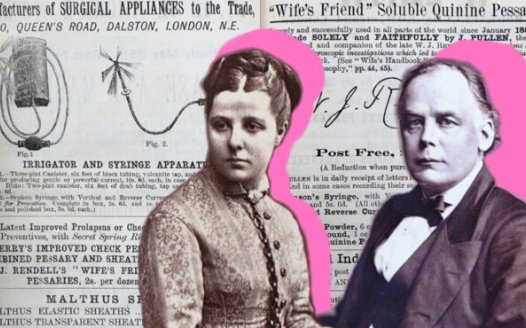NSS: Ending abortion pills by post a “regression in women’s rights”
Posted: Thu, 24th Feb 2022
The National Secular Society has warned the government's decision to end abortion 'pills by post' is a "regression" in women's rights.
The government has today announced that a policy enacted in response to Covid-19 to allow early medical abortions at home in England will be scrapped at the end of August.
The move follows interventions from the Church of England, which opposes abortion on principle.
Mark Sheard, the chairman of the Mission and Public Affairs Council, said he had written to health secretary Sajid Javid calling for the policy to be scrapped.
In response, the National Secular Society wrote to Javid last week, saying religious ideology should not influence healthcare policies, "especially when appeasing 'pro-life' religious interest groups will undermine the health, safety and well-being of women".
Support for 'pills by post'
In 2020 the government enabled women to receive all medication by post for abortions before 10 weeks' gestation following a telephone consultation, instead of visiting a clinic.
Last year the NSS joined medical organisations and women's rights campaigners in backing proposals to make the 'pills by post' provisions permanent.
The 'pills by post' provision is supported by the Royal College of Obstetricians and Gynaecologists, the Royal College of Midwives and the British Medical Association. Yesterday, in a joint letter co-signed by the NSS (text below), they told prime minister Boris Johnson that removing the service "would indicate a deep distrust of women and an institutional disregard for their reproductive rights".
According to the British Pregnancy Advice Service (BPAS) a record 86% of terminations were performed before 10 weeks' gestation in the first six months of 2020, which "minimises the risk of complications and ensures that no woman has to remain pregnant longer than necessary".
A study published last year, analysing the outcomes of more than 50,000 early medical abortions in England, Scotland and Wales between January and June 2020, found that 80 per cent of women said telemedicine was their preferred option and they would choose it in the future.
NSS chief executive Stephen Evans said: "This is a hugely disappointing decision. Early abortion care at home has proven to be safe, effective, accessible, and preferred by women.
"The decision to end it feels like a regression in women's reproductive rights – and indicates anti-choice religious influence at the heart of government.
"The Church of England's status as the established religion has given it a particularly privileged platform to demand that the government concede to its anti-abortion views.
"In this decision, religious ideology has appeared to trump advice from medical and women's rights organisations. It demonstrates the evermore pressing need to remove the CofE's privilege by separating church and state."
UPDATE 25 February 22: The Welsh government has said temporary arrangements allowing early abortions to be carried out at home in Wales will be made permanent.
Join letter to the Prime Minister

Dear Prime Minister,
We write to you with deep and urgent concern about the delay in announcing the permanen approval of telemedical abortion care. The current approval is used by 2000 women a week who require an early medical abortion, and the ongoing uncertainty presents a clear and present danger to their access to, and confidence in, their abortion care. Moreover, the delay is increasingly leading to a perception of the UK Government as willing to ignore the medical evidence on a key issue affecting women's health, undermining their right to make decisions about their health and future.
In March 2020, the then-Secretary of State for Health and Social Care gave permission for the first medication in an Early Medical Abortion (mifepristone) to be taken at home. Abortion providers rapidly reconfigured services to provide the option of telemedical care and made sure women and other people needing an abortion were able to continue to access abortion care throughout the pandemic.
As you know, the NHS continues to be tested to its limits and clinicians have adapted swiftly to ensure that patients continue to be provided with the highest quality care. The pandemic has been a tremendously difficult experience for the country, but we should be proud of the way health services responded to the situation, in particular, the rapid innovation of vital health services such as telemedical abortion.
It is estimated that between April 2020 and February 2022, more than 125,000 women have made the choice to access fully telemedical rather than face-to-face abortion services. Multiple studies have shown that this service is safe effective, accessible, and is often preferred by women – including the largest study of telemedical abortion care in the world. Offering of telemedical services as a permanent option is supported by clinicians, women's rights groups, and regulators including NICE, the Royal College of Obstetricians and Gynaecologists, the Royal College of Midwives and the Academy of Medical Royal Colleges.
The services that have been developed here in the UK are world-leading. We have set a global example with our leadership in and commitment to women's healthcare and choice. Recently, the United States Food and Drug Administration, based on research conducted in England and Scotland, made telemedical abortion care permanently legal. The only places in the USA which now outlaw the use of mifepristone outside a designated clinic, as a removal of the current English approval would do, are virulently anti-abortion States including those seeking to ban abortion from six weeks' gestation like Texas.
Meanwhile, telemedicine has created a more equitable service which has enabled thousands of people to access the care they need more quickly, and just as safely, while also being a more efficient use of NHS resources. Even before the pandemic, attending a clinic in person was prohibitively difficult for many women for a variety of reasons, including those living with an abusive or coercive partner, those with a disability or those who couldn't afford childcare or time off work. Removing telemedicine would result in the UK Government re-criminalising hundreds of vulnerable women each year under the Offences Against the Person Act 1861, who will be forced to turn to unregulated abortion pill providers.
The most recent British Social Attitudes study on abortion found that more than 90% of the public believe a woman should be able to end a pregnancy in certain circumstances, and 70% support the right to have an abortion if a woman does not want a child (a more liberal position than the current law). These figures do not vary by party affiliation or vote. Private YouGov polling of MPs in early 2020 found that 78% of MPs describe themselves as 'pro-choice', including 70% of Conservative MPs and 94% of the 2019 intake. And 2021 Savanta Com-Res polling from the Faculty of Sexual and Reproductive Healthcare found that only 15% of women do not support the permanent approval of telemedical abortion care.
We trust that your Government will continue this safe, effective service, and to offer women choice about their healthcare, in line with best clinical practice. To remove this service, despite the scientific and medical support it carries, would indicate a deep mistrust of women and an institutional disregard for their reproductive rights. At a time when women's reproductive rights and choices are being rolled back elsewhere in the world, we call for leadership in asking the Secretary of State for Health and Social Care to make this essential service permanent by the end of March.
Yours Sincerely,
Dr Edward Morris, President of the Royal College of Obstetricians and Gynaecologists
Dr Suzanne Tyler, Director of Member Services, Royal College of Midwives
Dr Gary Howsam, Vice Chair for External Affairs, Royal College of General Practitioners
Dr Latifa Patel, Acting Representative Body Chair, British Medical Association
Dr Asha Kasliwal, President, Faculty of Sexual & Reproductive Healthcare
Jonathan Lord and Tracey Masters, Co-Chairs of the British Society of Abortion Care Providers
Thorrun Govind, English Pharmacy Board Chair, Royal Pharmaceutical Society
Farah Nazeer, Chief Executive, Women's Aid Federation of England
Deniz Uğur, Deputy Director, End Violence Against Women Coalition
Jayne Butler, CEO Rape Crisis England & Wales
Dr Claire Dewsnap, President, British Association of Sexual Health and HIV
Clare Murphy, Chief Executive, British Pregnancy Advisory Service
Richard Bentley, UK Managing Director, MSI Reproductive Choices
Aaron Flaherty, Chief Executive, NUPAS
Jemima Olchawski, Chief Executive, Fawcett Society
Justine Roberts, CEO and founder of Mumsnet
Nikki Pound, Women's Equality Policy Officer, Trades Union Congress
Ros Bragg, Director, Maternity Action
Amy Gibbs, Chief Executive, Birthrights
Kerry Abel, Chair, Abortion Rights
Ian Green, Chief Executive, Terrence Higgins Trust
Helen Marshall, Chief Executive, Brook
Jayne Kavanagh, Co-chair, Doctors for Choice UK
Mandu Reid, Leader, Women's Equality Party
International Planned Parenthood Federation
Emma Campbell and Naomi Connor, Co-convenors, Alliance for Choice
Lesley Hoggart, Co-director Abortion Talk
Mara Clarke, Founder, Abortion Support Network
Sister Supporter
Florence Schechter, Director, Vagina Museum
Stephen Evans, Chief Executive, National Secular Society
Andrew Copson, Chief Executive, Humanists UK
Maïté Matos Ichaso, Director, Safe Abortion Action Fund
Reproductive rights
Religion should never block access to abortion or contraception. Join our campaign to uphold reproductive rights.








